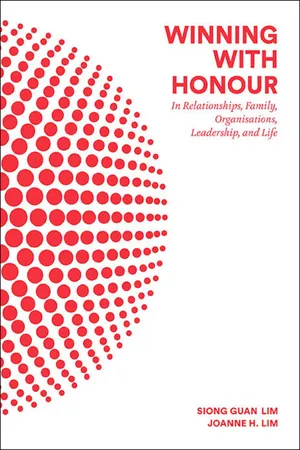![]()
PART I
HONOUR
SMALL THOUGHT, BIG IDEA
Honour defines our humanity—–we have Honour because we are.
Honour is like a muscle—–we are born with it, but whether it maintains its functionality and grows depends on whether we choose to exercise and train it.
Honour is ours to lose.
Honour is living by the virtues.
When you are honourable, you keep your word. You do the right thing regardless of what others are doing.
WHAT IS HONOUR?
Many people, when challenged with the proposition of Honour and honouring, react by saying: “I agree that ‘Honour’ is important, but what exactly do you mean by ‘Honour’?”
As a verb, honour means to ascribe value, esteem, regard or respect to a person or thing. As an adjective, it is the quality of knowing and doing what is morally right. As a noun, Honour is something that symbolises recognition and privilege.
Whether it is used as a verb, adjective, or noun, practically everyone agrees that Honour is a virtue important for life and living.
Honour defines our humanity—it is a universally recognised and esteemed value not defined or confined by religious or cultural mores. We have Honour because we are.
Deep within each of us there is a sense of something that makes us worthy as a human being, and that something is Honour. It is like a muscle—we are born with it, but whether it maintains its functionality and grows depends on whether we choose to exercise and train it. Honour is ours to lose.
HONOUR, THE VIRTUE OF ALL VIRTUES
The Virtues Project1 was founded in Canada in 1991 by Linda Kavelin Popov, Dr. Dan Popov, and John Kavelin, and was honoured by the United Nations during the International Year of the Family as a “model global program for families of all cultures”.
The Virtues Project conducted research across religions, ethnicities, beliefs, and cultures to find the meaning of life; their research found that virtues (which are values in action) are “the very meaning and purpose of our lives”, “the content of our character”, “the elements of the human spirit”, “the truest expression of our souls”, and “the essence of authentic success”.
According to their research, “Honour is living by the virtues. It is showing great respect for yourself, other people and the rules you live by. When you are honourable, you keep your word. You do the right thing regardless of what others are doing.”
Values only become virtues if they are lived out. As Honour is the virtue of living by the virtues, Honour can be said to be the virtue of all virtues.
Honour can be said to be the virtue of all virtues.
Honour is something we offer someone, whereas trust or respect is our reaction to someone.
The point of reference for “trust” or “respect” is ourselves, whereas the point of reference for “Honour” is the other person.
Honour is an offer we initiate not because of reward, but because it is the right thing to do.
HONOUR IS SOMETHING WE OFFER
Some people have wondered why we choose the word “Honour” rather than a simpler and less abstract word such as “trust” or “respect”. The reason is that there is a critical point about Honour that would be lost if it were replaced with trust or respect.
Think about it in this way. Honour is something we offer someone, whereas trust or respect is our reaction to someone.
If people behave in a way which makes us believe in them, or demonstrate skills and abilities that impress us, we give them our trust and respect. In contrast, Honour is what we offer them because we believe we should honour them, just because they are fellow human beings.
To understand the point about Honour being a matter of giving, think about the difference between “liking” and “loving” someone. Much too often people use the words “like” and “love” as though they are interchangeable. But they are not the same in a very important way.
When we “like” something or someone, it is because there is something about the thing or person that pleases us. So when we “like”, the point of reference is, in fact, ourselves.
The situation is quite different when we “love.” If we “love” someone, we will always be thinking of doing what we can to make the other person happy, comfortable or satisfied. It may be giving presents, spending time together, giving words of praise or encouragement, serving them in some way, or simply hugging them. The focus is the other person.
Clearly then, the focus of “liking” is ourselves, while the focus of “loving” is the other person. The first is “me” centred, while the second is “others” centred. In the same way, the point of reference for “trust” or “respect” is ourselves, whereas the point of reference for “Honour” is the other person.
Of course, when we honour someone, we are likely in turn to get their trust, respect, or regard. Nevertheless, Honour, like love, is an offer we initiate not because of reward, but because it is the right thing to do.
To offer Honour is an act of humility and kindness, courage and initiative.
If what we want or what we need are long term relationships, whether they be personal, public, or professional, trust and respect is what we must have.
The foundation of trust is Honour.
Honour should be a way of life and cannot be left as an ideal… it is the way to a satisfied life.
Some people feel that to honour someone is a sign of weakness and subservience, of losing out or losing face. No doubt, to offer Honour is an act of humility and kindness, and at the same time it often also is an act of courage and initiative. But there are good reasons for doing so, and, at worst, it would simply be an act of “enlightened self-interest”.
Think of how we choose our friends. We choose people who we can trust, who can keep our secrets, and who we believe care about us as we care about them. The friendship is sustained if there is a mutual expression of Honour, but as soon as one party dishonours the friendship, trust is lost and the friendship is threatened.
In the same way, think of a business. If all we want is to make a quick sale, we may simply charge a high price or knowingly provide a defective product to get rid of existing stock. But we can be sure that that will be the first and last time the customer will deal with us. If what we want is not just the first sale, but the customer to come again in the future and to introduce his friends as new customers, we will be interested in forging long-term relationships built on good service, honesty, and trustworthiness. We have to start by treating the customers with Honour.
If what we want or what we need are long-term relationships, whether they be personal, public, or professional, trust is what we must have. And the foundation of trust is Honour.
Honour should be a way of life and cannot be left as an ideal…for as we see in the next part, it is the way to a satisfied life.
![]()
PART II
HONOUR FOR A SATISFIED LIFE
HONOURING OUR HUMANITY
The Harvard Grant Study revealed a few secrets to a satisfied life:
•Secret #1: Value Love Above Everything
•Secret #2: Relationships Matter a Lot
•Secret #3: Beware Alcohol and Cigarettes
•Secret #4: Be Content
•Secret #5: It is Never Too Late to Change
•Secret #6: It is Mostly Up to Us
The Harvard Grant Study revealed that early relationships are significant.
Ask any human being, and he or she will tell you that they want to be satisfied.
But what exactly makes a satisfied life?
HARVARD STUDY ON SATISFACTION
Harvard University conducted an epic study over 75 years to determine what human beings need to live a satisfied life and to flourish in life.
The Harvard Grant Study began in 1938 and followed 268 Harvard undergraduate men who came from all walks of life. Over 75 years, researchers followed developments in the men’s lives and tracked a wide range of psychological, anthropological, and physical traits, including intelligence levels, alcohol intake, relationships, income, and even the “hanging length of his scrotum”!
Dr George Vaillant led the study from 1972 to 2004 and published the fascinating findings in 2012 in a book entitled: “Triumphs of Experience: The Men of the Harvard Grant Study” (Belknap Press).
The study revealed a few secrets to living a satisfied life, which we list here:
•Secret #1: Value Love Above...




